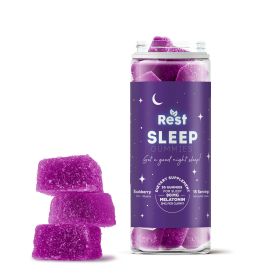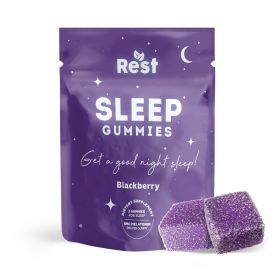Melatonin Supplements
Customer Reviews
Common Questions
Melatonin Supplements
Melatonin is a hormone naturally produced by the body that helps regulate sleep-wake cycles. It is commonly known as the "sleep hormone," as its production increases in the evening and decreases in the morning. For some individuals, however, the body may not produce enough melatonin or may have difficulty regulating its production. As a result, some people turn to melatonin supplements to help them fall asleep or adjust to changes in their sleep schedule, such as when traveling across time zones.
Melatonin supplements are widely available in various forms, including tablets, melatonin capsules, and gummies. While they are generally considered safe to use in the short term, there is ongoing research to understand the potential long-term effects of melatonin supplement use fully. In this article, we will discuss the benefits and risks of melatonin supplements and guide proper dosing and usage.
Melatonin Supplements: What Are They?
The pineal gland produces melatonin hormones in the brain, which regulates what scientists call the “sleep-wake cycle.” Typically, melatonin levels increase in the evening. However, people take melatonin supplements when they are having trouble falling asleep. Melatonin levels should naturally increase in the body in the evening, making you sleepy. But for many people, they don't. That’s where supplements come into play.
Melatonin supplements are available in various forms. Some of the most popular include the following:
- Tablets
- Capsules
- Gummies
- Pills
The type of melatonin supplement chosen may depend on personal preference and potential side effects. For example, some people may find that tablets cause stomach discomfort, while others may prefer the convenience of melatonin gummies. It is important to note that the timing and dosage of melatonin supplements may vary depending on the form and strength.
How Melatonin Supplements Compare to Other Sleep Aids
Melatonin supplements are not considered medications, as they are not meant to treat, cure, or prevent any specific medical condition. They are classified as dietary supplements, which are regulated differently than medications.
There are several other types of sleep aids available, including prescription medications and over-the-counter (OTC) products. Some examples of sleep aids include:
- Prescription medications: These include drugs such as sedatives, hypnotics, and antihistamines, which are prescribed by a healthcare professional to help individuals fall asleep and stay asleep. These medications may have potential side effects and may not be suitable for long-term use.
- OTC products: These include diphenhydramine (e.g., Benadryl) and doxylamine (e.g., Unisom), which are available without a prescription and can be used to help with sleep. These products may cause drowsiness and may not be suitable for long-term use.
Compared to some sleep aids, melatonin supplements may have fewer potential side effects and may be suitable for long-term use. However, it is essential to note that melatonin supplements may not be effective for everyone and may interact with certain medications. Speaking with a healthcare professional before starting any sleep aid, including melatonin supplements, is always recommended.
Discovering Melatonin Supplements
Sleep aids containing melatonin are among the most popular on the market because they regulate circadian rhythms and promote natural sleep. But they're not the only sleep aid available. The ability of Melatonin supplements to help people sleep naturally still makes them so popular.
A Brief History of Melatonin Supplements
The role of melatonin in the body's sleep-wake cycle was first discovered in the 1950s. In the 1980s, melatonin was synthesized and became available as a dietary supplement. It has since become widely known and is often used as a natural remedy to help with sleep and jet lag.
Melatonin has also been studied for its potential role in other health conditions, such as seasonal affective disorder (SAD) and anxiety. However, more research is needed to fully understand the effects of melatonin in these and other conditions.
Melatonin Supplements: A Sleep Aid Among Many
Melatonin Supplements are just one of several types of sleep aids available today, including prescription medications, over-the-counter (OTC) products, and natural remedies. What makes melatonin so unique, though? Let’s take a look.
- Sedatives, Hypnotics, and Antihistamines: These are prescribed by a healthcare professional to help individuals fall asleep and stay asleep. Some potential benefits of these prescription sleep aids include their ability to provide quick relief for insomnia and other sleep disorders. However, they may also have possible side effects, including dizziness, drowsiness, and dry mouth, and may not be suitable for long-term use.
- Diphenhydramine (e.g., Benadryl) and Doxylamine (e.g., Unisom): These are over-the-counter products that are available without a prescription and can help with sleep. Some potential benefits of OTC sleep aids include their convenience and availability. However, they may also cause drowsiness and may not be suitable for long-term use.
- Melatonin Supplements: These are derived from natural sources and are available without a prescription. Some potential benefits of natural sleep aids include their potentially fewer side effects and suitability for long-term use. However, their effectiveness may vary, and they may interact with certain medications.
Melatonin Supplements: Which One Is Right For Me?
As many different melatonin supplements are available today, it's hard to say which is the most popular. It depends on the brand and form. Different types of melatonin supplements include tablets, capsules, and gummies. Some are designed for daily use, while others are meant to be used as needed. Some even come blended with cannabinoid products for a more intense effect.
The chart below will help you determine which melatonin supplements are best for you:
|
Supplement Form |
Benefits |
Drawbacks |
|---|---|---|
|
Tablet |
Can be easily swallowed - Widely available in various dosages |
May cause stomach discomfort - May have a bitter taste |
|
Capsule |
Can be easily swallowed - Widely available in various dosages |
May cause stomach discomfort - May have a bitter taste |
|
Gummy |
Convenient to take - May have a more pleasant taste |
May contain added sugars and calories - May not be as widely available in various dosages |
|
Sublingual (dissolved under the tongue) |
Faster absorption into the body - May have a more pleasant taste |
May cause mouth irritation - May not be as widely available in various dosages |
|
Spray |
Easy to apply - May have a more pleasant taste |
May cause throat irritation - May not be as effective as other forms |
|
Blended (w/cannabinoids) |
More intense effects - Some euphoria - Other benefits |
May cause unwanted effects - May not be legal in your state |
What Are the Benefits of Melatonin Supplements?
While we all think of melatonin products as sleep aids, or supplements that promote the body’s natural sleep cycles, research shows they can do much more. Melatonin is a powerful sleep supplement when used correctly. However, it has several other benefits of which you may be unaware.
Melatonin supplements have been studied for their potential benefits in various areas, including sleep and jet lag. Here are a few examples of research studies on melatonin supplements:
- Sleep: Melatonin supplements have been studied for their potential to improve sleep in people with insomnia and other sleep disorders. Some studies have found that melatonin supplements may be effective in helping individuals fall asleep faster and enhancing the quality of sleep.
- Jet lag: Melatonin supplements have been studied for their potential to reduce jet lag, which is a condition that occurs when an individual travels across multiple time zones and experiences sleep disturbances as a result. Some studies have found that melatonin supplements may be effective in helping individuals adjust to changes in their sleep schedule when traveling.
- Seasonal affective disorder (SAD): Melatonin supplements have been studied for their potential to improve symptoms of SAD, which is a type of depression that occurs during the winter months when there is less natural sunlight. Some studies have found that melatonin supplements may be effective in improving sleep and mood in individuals with SAD.
It is important to note that more research is needed to understand the potential benefits and risks of melatonin supplements fully. Speaking with a healthcare professional before starting any supplement, including melatonin, is always recommended.
Do Melatonin Supplements Have Any Adverse Effects?
As with all supplements (and anything you put in your body), melatonin supplements can have unwanted side effects if misused. Remember, melatonin is not a medication approved by the Food and Drug Administration to cure, diagnose, or prevent any illness or injury. As a supplement, it is intended to be used as directed on the label. Always purchase from reputable sources like CBD Mall, which uses third-party labs to test for safety and efficacy.
The adverse effects of melatonin supplements can range from mild to severe, depending on how it was used. These side effects can include the following:
- Drowsiness
- Headache
- Dizziness
- Nausea
- Seizures
- Chest pain
- Rapid heartbeat
- High blood pressure
Should you experience any of the above, cease using melatonin supplements immediately and seek medical help.
How Do I Dose Melatonin Supplements?
Dosing melatonin is not a one-size-fits-all proposition. The appropriate dosage may vary depending on your age, weight, and the reason for taking the supplement. It is always recommended you follow the directions on the product’s label.
In general, the following are some guidelines for dosing melatonin supplements in adults:
- Tablet: The recommended starting dose for adults is 1-3mg, taken 30-60 minutes before bedtime. Some people may need to adjust their dosage based on their response to the supplement.
- Capsule: The recommended starting dose for adults is 1-3 mg taken 30-60 minutes before bedtime. Some people may need to adjust their dosage based on their response to the supplement.
- Gummy: The recommended starting dose for adults is 1-3 mg taken 30-60 minutes before bedtime. Some people may need to adjust their dosage based on their response to the supplement. It is important to note that gummies may contain added sugars and calories.
- Sublingual (dissolved under the tongue): The recommended starting dose for adults is 1-3mg, taken 30-60 minutes before bedtime. Some people may need to adjust their dosage based on their response to the supplement.
- Spray: The recommended starting dose for adults is 1-3mg, sprayed under the tongue 30-60 minutes before bedtime. Some people may need to adjust their dosage based on their response to the supplement.
Dosing Melatonin Supplements: Does Age Matter?
Age may only be a number, but it does matter for seniors when it comes to melatonin supplements. It is recommended that seniors take a lower dosage than younger adults. See the table below:
|
Age |
Recommended Dosage |
|---|---|
|
Adults 18-64 |
0.5-10 mg, taken 30 minutes to an hour before bedtime |
|
Seniors 65+ |
0.5-5 mg, taken 30 minutes to an hour before bedtime |
Final Thoughts on Melatonin Supplements
Many people may not know about melatonin supplements because they may not work the same for everyone. While melatonin supplements have been studied for their potential to improve sleep and help with jet lag, their effectiveness may vary among individuals. In some cases, melatonin supplements may not affect sleep or only have a short-term impact. You should start with a lower dose and work your way up. If you take them longer than a few weeks, you may want to take a break.
It is also important to note that melatonin supplements may interact with certain medications and may not be suitable for everyone. For example, melatonin supplements may interact with blood pressure medications and blood thinners and may not be ideal for people with autoimmune disorders or depression. It is always recommended to speak with a healthcare professional before starting any supplement, including melatonin, to determine its suitability and potential risks.


